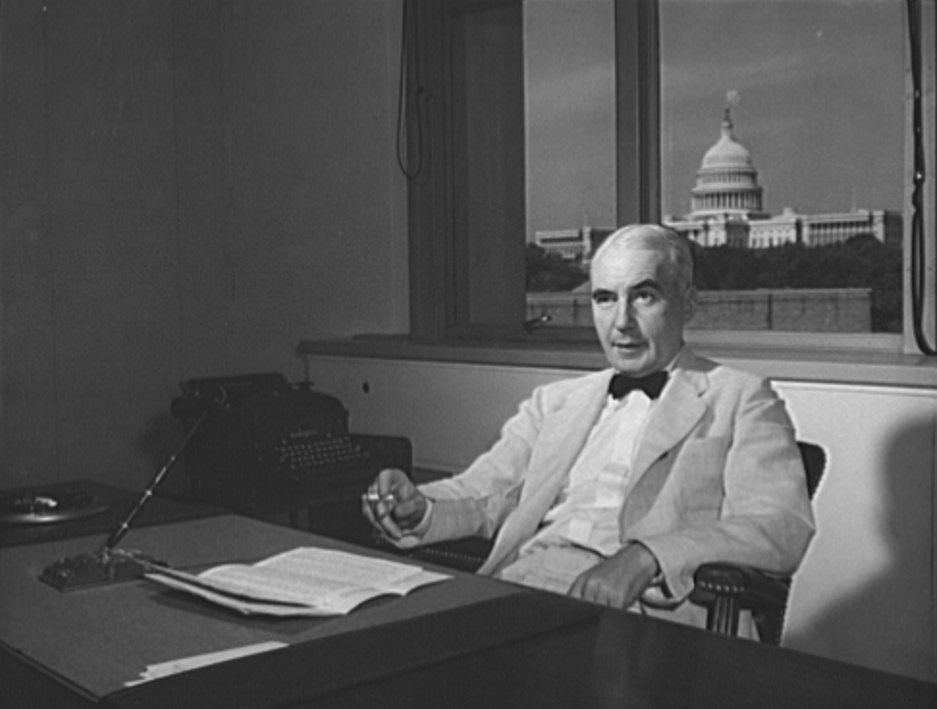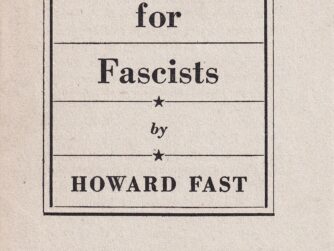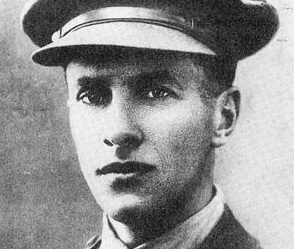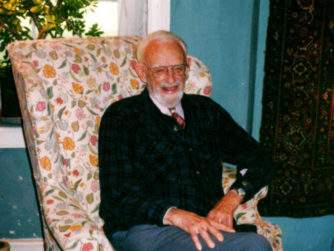On May 3, 1943, the Office of War Information (OWI) Director Elmer Davis was heard in Europe in a Voice of America (VOA) radio broadcast supporting the Soviet propaganda description of the Katyn Forest massacre of thousands of Polish military officers in Russian captivity. What Davis said in the VOA broadcast and in the same commentary aired by U.S. domestic radio networks was one of the greatest Soviet lies of the 20th century. Davis later claimed that he did not know the truth, but there was strong evidence to suggest that he did. A bipartisan committee of the U.S. House of Representatives, which in 1951-1952 investigated the Katyn massacre, strongly criticized Elmer Davis, his Katyn broadcast, and the Voice of America.
Elmer Davis, Director, Office of War Information (OWI), Alfred T. Palmer, photographer. Part of: Farm Security Administration – Office of War Information Photograph Collection, Library of Congress Prints and Photographs Division, Washington, D.C. 20540.
Soviet Russia’s lie that Hitler and Nazi Germans and not Stalin and Soviet Communists were responsible for the mass execution murder of over 20,000 Polish officers, intellectual leaders, and other prisoners of war in the Katyn Forest massacre, was the greatest fake news of the World War II and the Cold War period, which the U.S. government-run Voice of America (VOA) under its agency head Elmer Davis and pro-Soviet VOA’s first director John Houseman helped to spread starting in April and May 1943.
The Soviet Katyn lie was promoted by VOA from April 1943 to about 1945, but for several more years after the war VOA still continued to ignore the mass murder and its earlier complicity in the Soviet campaign of denials and lies. Americans would not learn that during World War II the Soviet Union had control over VOA’s Katyn reporting, as well as VOA reporting on all Soviet actions in East-Central Europe, thanks to many communist sympathizers working as officials and journalists for VOA in its early years.
While VOA stopped actively promoting the Katyn lie at the end of the war while still not yet being willing to tell the whole truth, the lie persisted in Soviet government and media statements much longer, from April 1943 until 1990, when the Soviet authorities finally admitted that the Soviet secret police NKVD had been responsible for this act of genocide.
For many years, the facts were quite different from what Soviet officials were saying that what the Voice of America was initially reporting. The NKVD murdered the Polish prisoners of war at various locations in the Soviet Union on the orders issued in early March 1940 by Soviet dictator Joseph Stalin and the Communist Party Politburo. The mass executions became known collectively as the Katyn Forest Massacre after the first graves were discovered by the Germans in Katyn near Smolensk, in Western Russia, in April 1943. The executions were conducted in Katyn and in several other locations in the Soviet Union.
Neither Elmer Davis, John Houseman whom the U.S. State Department accused secretly to the FDR White House of being a communist sympathizer, nor the Voice of America, ever apologized to thousands of wives, mothers and children of the murdered Polish officers for helping to spread deceptive and fake Soviet Katyn news and VOA’s own commentaries in support of these and other Soviet lies. Many members of the families of the murdered men were themselves deported by the Soviets to the Gulag. Hundreds of thousands of such prisoners–men, women and children– died there from heavy labor, cold, illnesses, lack of medical care and starvation.
Most Polish citizens (the murdered in the Katyn massacres also included hundreds of Polish citizens who were Jews, Ukrainians, Belorussians and members of other nationalities), who at that time lived in the Soviet Union or in Nazi-occupied Poland, would not have been able to listen to Voice of America shortwave radio broadcasts, but some of their family members who had escaped to Great Britain and to other parts of unoccupied Europe would have been deceived by VOA’s Soviet lies and propaganda, as any person desperate for information about their loved ones might be under such circumstances. Even in Nazi-occupied Poland and in the Soviet Union, false Soviet news repeated by the Voice of America about their sons, husbands and fathers would have reached at least some family members of Katyn victims.
President Roosevelt’s chief propagandist Elmer Davis was formerly a well-known New York Times reporter and CBS news commentator. FDR hired him because of his popularity as a radio announcer with a great voice for delivering news, and urged him to continue his radio broadcasts in the United States while working for him in the Office of War Information. Elmer Davis did, thus giving President Roosevelt and the White House an opportunity to propagandize to Americans during wartime. These domestic and international broadcasts did include a lot of useful factual information, as well as anti-Nazi and anti-Fascist messages. However, they also included pro-Soviet messages, including propaganda and lies which Stalin wanted Americans and VOA’s foreign audiences to hear. At the same time, the Voice of America was not broadcasting in Russian because pro-Soviet Roosevelt Administration officials apparently were afraid of offending Stalin. VOA would not start its Russian-language broadcasts until 1947. While working as the head of the Office of War Information and recording commentaries for the Voice of America and domestic radio networks in the United States, Elmer Davis managed to deceive and confuse U.S. media and public opinion by claiming that reports of Polish officers being killed by the Russians in the Katyn Forest massacre were “fishy’ and “phony propaganda stories.” The New York Times reported his radio comments on May 6, 1943, but other New York Times reports highlighted facts pointing to Russia’s hand in the mass murder. At that time, the Voice of America would not report any negative news about the Soviet Union, Stalin or communist parties and front organizations controlled by Moscow. In 1943 VOA news was written and edited by Howard Fast, a best-selling author of historical novels who later worked for the Communist Party USA newspaper The Daily Worker and received the 1953 Stalin Peace Prize. He also spent three months in a Federal prison after his conviction for contempt of Congress.
VOA started to tell partial truth about the Katyn murders only after 1945 and did not report fully on this and other Soviet atrocities until about 1952. Even later there was some VOA censorship on Katyn which lasted until President Reagan took office in 1981.
It is now an almost totally forgotten fact that parts of the U.S. government, but generally not in the U.S. Congress, were complicit in helping to spread the Soviet propaganda lie and fake news about Katyn. The most active in pushing the Soviet propaganda lie about Katyn were pro-Soviet and communist sympathizers in the wartime agency, which included what would later be known as the Voice of America. Full and honest reporting on Katyn by VOA started only in the early 1950s due to tremendous criticism and pressure from the U.S. Congress and the Polish American community, but later the story was again largely ignored in VOA broadcasts. At the same time, Radio Free Europe (RFE) and Radio Liberty (RL), also funded by the U.S. government and operating semi-independently since the early 1950s from Munich in West Germany, were reporting fully and honestly on the Katyn Forest Massacre story to audiences behind the Iron Curtain throughout the Cold War. During the Reagan Administration in the 1980s, VOA resumed unrestricted reporting on Katyn and other Soviet atrocities.
Office of War Information Director Elmer Davis, who was appointed to this position in the newly created agency by President Franklin Delano Roosevelt in June 1942, began promoting the Soviet propaganda lie about the Katyn Forest Massacre in broadcasts on domestic U.S. radio networks as well as in Voice of America radio transmissions overseas in April and May 1943. VOA radio programs were produced in New York by the U.S. government wartime propaganda agency under his overall direction. He himself recorded a weekly commentary, which was broadcast during part of the war by both the Voice of America overseas and domestically on U.S. radio networks. Thanks to him, the Executive Branch had a propaganda outlet to address both Americans and radio listeners abroad. Soviet propaganda messages, including the Katyn lie, were spread by the Roosevelt Administration to both domestic and foreign audiences despite protests in the U.S. Congress and critical U.S. media reports during World War II. Elmer Davis remained in charge of the Office of War Information until September 1945 when the office was dissolved by President Truman, and he found himself without a job. VOA was transferred to the State Department.
The first director of the Voice of America, John Houseman who later became a well-known Hollywood actor, was secretly identified by the State Department and the U.S. Army Intelligence in early April 1943 as a Soviet sympathizer who was hiring communists to fill VOA broadcasting positions. Even if the vast majority of them were not actual Soviet agents of influence, they determined the tone and content of VOA broadcasts.
In mid-April 1943, shortly after the Germans announced the discovery of the Katyn graves and Soviet Russia denied any responsibility for the mass murder, the U.S. State Department advised Elmer Davis to avoid taking sides on the Katyn Massacre, but he ignored the advice of U.S. diplomats and others who told him that the atrocity was almost certainly committed by the Soviets. At that time, the VOA Polish desk in New York was dominated by communist sympathizers working with John Houseman, who promoted the Soviet Katyn lie as a true news story. One of them was VOA’s chief news writer and editor Howard Fast, who later joined the Communist Party USA and in 1953 received the Stalin Peace Prize. Houseman was forced to resign from his position in mid-1943, and Fast left in January 1944.
Even before the Katyn Forest Massacre story broke in mid-April 1943, the State Department refused to give Houseman a U.S. passport for official U.S. government travel abroad and informed the Roosevelt White House that Houseman along with several other OWI employees should be regarded as unreliable. After Houseman’s forced departure from the Voice of America in the summer of 1943, the pro-Soviet staff he had hired and other key managers under Elmer Davis continued to broadcast Soviet lies about Katyn and other Soviet propaganda until the end of the war and possibly even longer. After the war, a few of these VOA broadcasters, people such as Stefan Arski, aka Artur Salman, went to work for communist regimes in Eastern Europe as anti-U.S. propagandists or diplomats. They were eventually replaced at VOA by anti-communist refugee journalists from Eastern Europe. But even these anti-communist broadcasters, such as the famous Polish anti-Nazi fighter Zofia Korbońska, for many years had a hard time trying to convince their managers to pay more attention to the Katyn Forest Massacre story.
The Voice of America avoided reporting on the Katyn Forest Massacre in any great detail until about 1952 when pressure from the U.S. Congress and the Korean War combined with the intensification of the Cold War in Europe forced VOA’s management, which was then in the State Department, to significantly increase reporting on the congressional investigation of the Katyn Massacre and on Stalinist atrocities in general. This enhanced VOA coverage lasted only a short time.
In the early 1950s, Elmer Davis was criticized for his role in enabling the spread of Soviet fake news through the Voice of America, but later the whole incident was forgotten and became part of the Katyn cover-up. A bipartisan select committee of the U.S. House of Representatives, which conducted an investigation of the Katyn Forest Massacre, concluded in 1952 that Elmer Davis was responsible for spreading fake Soviet propaganda news through the Voice of America. The congressional committee also found that his agency, including one of its officials, future U.S. Senator Alan Cranston (D-CA), engaged in illegal attempts to censor and suppress U.S. ethnic media because of their true reporting on the Katyn Forest Massacre and the Soviet Union. Elmer Davis himself took measures in trying to get the U.S. Department of Justice to shut down a Polish American newspaper. The Final Report issued by the bipartisan Madden Committee, named after its chairman Rep. Ray Madden (D-IN), was almost never mentioned in books and articles written about VOA, most likely because it reflected poorly on the Roosevelt Administration and VOA’s early management and history.
The 1943 secret State Department memorandum identifying the first VOA director John Houseman as a pro-Soviet communist sympathizer was declassified in the 1970s, but it also has not been mentioned in books or articles about VOA or the Katyn Forest Massacre. The formerly classified State Department memorandum about Soviet and communist influence in the Office of War Information with its Voice of America broadcasts was first highlighted by the Cold War Radio Museum in May 2018 to a wider reading audience interested in the history of U.S. international broadcasting. During World War II, OWI’s overseas radio broadcasts were not yet commonly referred to as “Voice of America” broadcasts but the OWI unit in charge of them eventually became officially known as the Voice of America. It is important to remember that the United States was engaged at that time in a total war with Nazi Germany and Japan, and the Soviet Union was a valuable military ally in the war. Russia, however, was not America’s political ally, although parts of the Roosevelt Administration and the Voice of America tried to present it as such and to promote Stalin as a believer in democracy and supporter of peace and freedom.
Even during World War II, many members of Congress were warning that the Voice of America pro-Soviet Russia propaganda was wrong and dangerous. In 1952, they criticized Elmer Davis but not John Houseman who escaped scrutiny and was quickly forgotten but was later presented by some of his admirers at the Voice of America as a model of journalistic objectivity and truthful news reporting. He cultivated that image in his later life as a successful Hollywood actor.
Even Elmer Davis presented himself later as a fighter for honest journalism, but that is not how a bipartisan congressional committee saw him in 1952 based on his performance from 1942 to 1945 as the director of the Office of War Information.
Mr. Davis, therefore, bears the responsibility for accepting the Soviet propaganda version of the Katyn massacre without full investigation. A very simple check with either Army Intelligence (G- 2) or the State Department would have revealed that the Katyn massacre issue was extremely controversial.[ref]The Katyn Forest Massacre. Final Report of the Select Committee to Conduct an Investigation of the Facts, Evidence and Circumstances of the Katyn Forest Massacre pursuant to H. Res. 390 and H. Res. 539, Eighty-Second Congress, a resolution to authorize the investigation of the mass murder of Polish officers in the Katyn Forest near Smolensk, Russia, (Washington D.C.: U.S. Government Printing Office, 1952), accessed October 26, 2017, https://babel.hathitrust.org/cgi/pt?id=osu.32435078695582.[/ref]
Elmer Davis’ Voice of America overseas broadcast on May 3, 1943, which also happened to be Poland’s national holiday in commemoration of the May 3rd Constitution, was callous in its lack of empathy for thousands of victims and their families. It included a number of obviously false and misleading assertions. One of them was that medical experts would not have been able to tell how long ago the men were executed.
Audio Recording of Soviet Katyn Propaganda Lie in U.S. Domestic Radio and Voice of America Broadcast by Elmer Davis, Office of War Information (OWI) Director
But while the German armies are finding it pretty tough going, the German propaganda won a striking success last week when it succeeded in bringing about a break in diplomatic relations between Russia and the Polish government in exile. The way the Germans did it is a good example of the doctrine Hitler preached in Mein Kampf, that it is easier to make most people swallow a big lie than a little one. When the Germans had beaten Poland in September 1939, the Russians moved in and occupied eastern Poland, taking thousands of Polish troops as prisoners. In June 1941, when the Germans attacked Russia, they overran all this territory and have held it since. Now, almost two years later they suddenly claim to have discovered near Smolensk the corpses of thousands of Polish officers, who, according to the Nazis, were murdered by the Russians three years ago.
In several respects, this story looks very fishy. At first, the Nazis were quite uncertain about the number killed; they said 10,000, then 2,000 and then 5,000, before finally deciding on 12,000. Rome and Berlin disagreed as to how they had been killed. The Japs and the Vichy French got their signals crossed and were telling about Rumanians murdered in Odessa, not Poles in Smolensk. First, Rome and Berlin disagreed as to how they had been killed. The remains must have been better preserved than is usual after three years. The Russians were said to have tried hard to conceal the graves, yet they buried every man in uniform with his identification tag, according to the German story. Suggestions of an investigation by the International Red Cross mean nothing, for the Germans control the area. It would be easy for them to show the investigators corpse in uniform with identification tags. But there is no way the investigators could determine whether these men were killed by the Russians, or by the Germans, as they probably were. The Nazis are known to have slaughtered hundreds of thousands of Poles after the fighting was over. If they found a camp full of Polish prisoners when they attacked Russia, it would have been the most natural thing in the world for the Germans to murder them, too, if not at the moment, then later when they needed corpses for propaganda exhibits.
Remember that when the Germans invaded Poland, they told the world that they had found the graves of thousands of German civilians massacred by the Poles. Few people ever believed that story; it is all the more remarkable that any Poles who remember it should believe this one, especially as its motives are so obvious. The first motive is to distract the attention of the world from the mass murders which the Germans have been steadily committing in Poland for three and a half years — murders by now so numerous that they look like a deliberate attempt to exterminate the Polish people. Another purpose would be to arouse suspicion and distrust between Russia and the rest of the United Nations — which would help the Germans in two ways. Directly, it might hamper the prosecution of the war that we are all fighting against Germany. Indirectly, it might help to prop up German morale at home. There is plenty of evidence that among the German civilian population — yes, even among the army — there is less belief that they can ever win a decisive victory over all their enemies. But German propaganda has persuaded many of them that any day now America and Britain might call off the war, make a compromise peace, and leave Germany free to turn on Russia. And of course, more people will believe that if there is trouble between Russia and any other of the United Nations.
Yet this lurid murder story, which so plainly can do no good to anybody but the Germans, had serious consequences for the Nazi propagandists were cleverly jabbing at a sore spot. The longstanding friction between Russia and Poland over the future frontier between those countries. This dispute is hundreds of years old. The Poles occupied much disputed territory after the war of 1920. The Russians moved back westward in 39. Two years later, the Germans pushed the Russians out. But statements by Russian leaders since have indicated that when they reconquer the territory they occupied in 1939 they mean to keep it. But the Poles insist on keeping it too, on retaining their country as it was before Hitler attacked them. The outsider looks as if the time to settle this argument is after Germany is licked. For until Germany is licked good and thoroughly, it won’t make any difference where you draw that frontier line. That the situation has been permitted to get into the present tangle is no credit to either Polish or Russian statesmanship. General Sikorski, head of the Polish government in exile, is an able and a reasonable man, but he is under constant pressure from a faction of extremists, the sort of men void of any sense of political realities who ruined Poland in the 18th century. But the reason these people were able to push Sikorski’s government into suggesting a Red Cross investigation of this fantastic murder story was that the Russians for months past had been completely un-receptive to any suggestions made by the Polish government for better and more humane treatment of Polish refugees in Russian territory.
The Poles have now apparently withdrawn their suggestion of a Red Cross investigation. But when they made it, the Russians promptly broke relations with them in a note whose violent language is hard to explain. If Stalin means to go on dealing with the Poles at all, it’s certainly poor policy for him to undermine Sikorski, the most reasonable of Polish leaders. And if, as unconfirmed rumors [sic] have suggested, if the Russians should set up in Moscow a rival Polish government in exile composed of fellow travelers, that would do Hitler more good and Russia more harm than anything Nazi propagandists could ever think up. This has been treated by both Poles and Russians pretty much as a matter that concerns them alone. If it were finally to be settled on that basis, Russia’s enormous preponderance in size would give the answer.
But anything that creates division among the United Nations is the concern of every one of those nations — the United States included — because we must all hold together to win the war. After the war, if the United Nations continue to hold together in some sort of collective security system, there will be less danger that any of the great powers might feel it had to safeguard its individual security at the expense of weaker neighbors. That is the only way this Polish-Russian issue can be treated — as one phase of the problem of world security.
The bipartisan Madden Committee concluded in 1952 that while some measures taken by the Office of War Information could have been excused as a wartime necessity with regard to Russia as a military ally, American officials and VOA journalists misled the American public and foreign audiences about the true nature of the Soviet regime thus preventing a more pragmatic policy toward Russia from being adopted. Considering the cost of the failure of the Yalta Agreement, it was a profoundly serious charge that was never answered and was quickly forgotten.
On November 11, 1952, the Madden Committee grilled Elmer Davis over his Soviet Katyn propaganda lie broadcasts. He was asked to read a large portion of his May 3, 1943 Voice of America commentary from a transcript reported at the time by the U.S. Embassy in Sweden. [The transcript read by Elmer Davis during his 1952 congressional testimony and presented by the Select Committee on the Katyn Investigation as one of the exhibits differs slightly from the original audio recording but does not alter its meaning. Minor edits might have been introduced in transcription.] Responding to questions from committee members, Davis gave a number of both revealing and misleading answers and lashed out at his congressional and Polish and Polish American critics, as John Houseman did later in his autobiography Unfinished Business.








